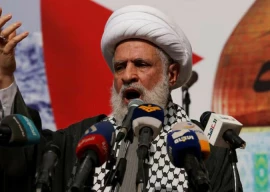1727760724-0/BeFunk_§_-(97)1727760724-0.jpg)
Israel has launched a ground invasion into Lebanon, marking a significant escalation in its ongoing conflict with Hezbollah, the Iranian-backed militant group.
Early on October 1, 2024, the Israeli military announced that its forces had begun "limited, localized, and targeted" ground raids in southern Lebanon, specifically targeting Hezbollah positions.
These raids were supported by Israeli air force and artillery strikes, with the goal of neutralizing immediate threats posed by Hezbollah militants stationed in villages close to Israel’s northern border.
The move comes after nearly a year of cross-border hostilities between Hezbollah and Israel, which intensified following an attack on October 7, 2023.
Hezbollah, a staunch ally of Hamas, began launching low-intensity rocket attacks on northern Israeli towns shortly after Israel’s military response to Hamas.
While the conflict has simmered for months, Israel’s decision to initiate a ground invasion represents a sharp escalation in the war, which has already drawn in several regional actors, including Syria and Iran.
In a statement released early on Tuesday, the Israeli military explained that the raids were "based on precise intelligence" and targeted Hezbollah cells that posed an imminent danger to Israeli towns near the border.
Local residents in southern Lebanese towns such as Aita al-Shaab reported heavy shelling and saw flares lighting up the night sky as the Israeli forces moved in.
The sounds of helicopters and drones filled the air as ground troops advanced into Hezbollah-controlled areas.
The ground invasion follows weeks of airstrikes and artillery barrages that have devastated large parts of Lebanon, particularly its southern regions and the suburbs of Beirut, which are known to be strongholds for Hezbollah. In one of the most significant blows to the militant group, Israeli airstrikes last Friday killed Hassan Nasrallah, Hezbollah’s longtime leader.
Nasrallah’s death was confirmed by Hezbollah, which vowed to continue its "holy war" against Israel in retaliation.
In response to Israel’s ground incursion, Hezbollah’s deputy leader, Naim Qassem, delivered a defiant speech on Monday, asserting that the group was prepared for a prolonged conflict.
“The resistance forces are ready for a ground engagement," he declared.
He added that Hezbollah had fired rockets reaching up to 150 kilometers (93 miles) into Israeli territory and warned that the battle could last for an extended period, drawing parallels to the 2006 Lebanon War between Hezbollah and Israel.
The Israeli ground invasion also coincided with airstrikes targeting other militant groups in Lebanon.
Early on Tuesday, Israeli forces struck the Ain al-Hilweh Palestinian refugee camp near the southern city of Sidon, targeting Mounir Maqdah, the commander of the Palestinian Fatah movement’s military wing.
His fate remains unclear, according to Palestinian security officials. The camp, Lebanon's largest, had previously avoided direct involvement in the conflict, but the airstrike signals an expansion of Israel's military operations.
In addition to southern Lebanon, Israel has ramped up its strikes in Syria, where it has long targeted Iranian-linked military positions.
On Tuesday, Syrian state media reported that an Israeli airstrike on Damascus killed three civilians and injured nine others. Although Israel did not comment on the strike, it has carried out similar attacks in Syria as part of its broader effort to weaken Iran’s influence in the region.
Lebanon has borne the brunt of Israel’s military campaign, with the Lebanese health ministry reporting that at least 95 people were killed and 172 wounded in Israeli strikes over the past 24 hours.
The majority of the casualties occurred in Lebanon's southern regions, the eastern Bekaa Valley, and the suburbs of Beirut.
In total, the conflict has displaced approximately one million Lebanese civilians, according to government sources, with many fleeing to Syria and other neighboring countries.
The international response to the escalating conflict has been mixed. US President Joe Biden called for an immediate ceasefire on Monday, expressing concerns over the widening war. “I’m comfortable with them stopping,” Biden told reporters when asked about Israel’s plans for a cross-border invasion.
However, despite pressure from the United States and France, Israel rejected a proposal for a 21-day ceasefire along the Lebanon border, which was intended to facilitate a diplomatic resolution and allow displaced civilians to return home.
Israeli officials argue that dismantling Hezbollah’s military infrastructure along the border is essential for ensuring the safety of northern Israeli communities, many of which have been evacuated due to Hezbollah rocket fire.
Israeli Defense Minister Yoav Gallant stated that the aim of the ground invasion is to create a buffer zone free of Hezbollah militants, thereby allowing civilians to safely return to their homes.
The conflict, which began as a response to a Hamas assault on Israel in October 2023, has steadily evolved into a broader regional war that threatens to draw in more actors, including Iran and the United States.
Hezbollah, which has close ties to Iran, has received significant financial and military support from Tehran.
Meanwhile, the US has provided Israel with military aid and diplomatic backing, although the Biden administration is pushing for a ceasefire to prevent further escalation.
With no clear end in sight, the Israeli ground invasion marks a critical turning point in the conflict, raising concerns about a prolonged and potentially wider regional war.
As Israeli troops continue their operations in southern Lebanon, the international community remains on edge, watching closely as both sides dig in for what could be a long and bloody confrontation.
1719315628-0/BeFunky-collage-(8)1719315628-0-405x300.webp)


1731329418-0/BeFunky-collage-(39)1731329418-0-165x106.webp)


1731821450-0/Untitled-design-(17)1731821450-0-270x192.webp)
1731822323-0/Copy-of-Untitled-(4)1731822323-0-270x192.webp)












COMMENTS
Comments are moderated and generally will be posted if they are on-topic and not abusive.
For more information, please see our Comments FAQ